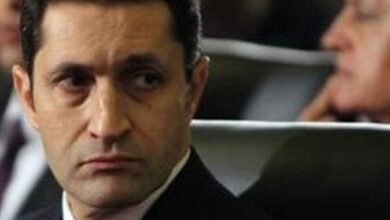The entry of our stretcher-borne ex-dictator into that courtroom cage marked a watershed between two qualitatively different Egyptian worlds: A stagnant past fettered by unquestionable certainties, and an indefinite future still faltering between hopes for a pluralist consensus and fears of a sanctimonious absolutism.
Ahmed Refaat – the presiding judge of case number 1227 at Cairo’s Qasr el-Nil district – is said to have remarked that his court should not be mistaken for theater. Yet, the spectacle unmistakably evoked Erasmus’ classic remarks on the cruel theatricality of being, particularly the one about the “manager” who could readily recast an erstwhile king into a “flunkey in patched clothes”.
Our deposed dictator did not return in rags. Instead, he came out wrapped in white sheets, bearing an uncanny resemblance to a mummy. But it did seem that all things were “presented by shadows”, as Erasmus would have it, so shadowy they prompted an Egyptian TV presenter to observe, through the crisscrossing metal gridlines and vertical bars, an artificial breathing machine appended to the former pharaoh. A civil case lawyer claimed that the ex-president was long dead and what we were seeing was his double.
Then the camera zoomed in. It captured his probing eyes, curt head movements and characteristic grimaces. There was no mistaking his identity. The familiar gestures resurrected in each one of us a universe we knew all too well for 30 years, evoking personal memories of lives lived and lost. To his left, the man responsible for many of the old regime’s recent misdeeds, a stillborn Oedipus who could never be king, stood motionless in front of the father whose political career he helped end, apparently with the help of his adoring mother. Not too far away sat the former interior minister and mass tormentor, his face radiating with apathy, as if to confirm that the gods first dement those they want to destroy.
Yet, in their stoic detachment, those inside the cage still seemed more at ease in their extinct world than those wrestling with the vexing uncertainties outside – for example, the contingent of disputatious lawyers, nervously treading wholly novel legal ground.
Among them, the most composed was the infamous Fareed el-Deeb, a favorite among Egypt’s most privileged. In between his deliberately confounding courtroom interventions, el-Deeb’s gaze projected a nihilist ennui – the haughty indifference of those skeptical of the possibility of progress, who contend that the process of interchanging roles and morphing masks is everlasting in a world “presented by shadows”.
El-Deeb will work tirelessly to frustrate the cathartic aspirations of the audience. He plans to summon an army of a thousand-plus witnesses. He will undoubtedly enrage the relatives of those murdered on orders from his clients. The courtroom may fill with chaotic rancor. But even if el-Deeb succeeds in partly diluting the show’s cleansing effects, it's not the end of the world. There is much psychological gratification in the illusory unity born of a vengeful, self-righteous consensus. Yet real rifts, concealed until now, can only become more intractable as the transition period wanes. What we need most at this point are the outlines of a tolerant, pluralistic order.
The opening proceedings of Mubarak’s trial gave us a glimpse of what can await us – a rational order where logical and empirical argument serve as arbiters between antagonistic, yet peacefully coexisting, parties. Despite suffering severe wear and tear through six decades of authoritarian misrule, and sporting some anachronistic features like that irritating cage, Egypt’s legal system has retained some essential elements upon which an open society can be erected.
Accordingly, those who so vehemently insist on the urgency of applying God’s law – in place of our current system of ostensibly satanic machinations – need to identify an exemplary case they would like to emulate. They need to point out that elusive country that claims to be applying divine justice while successfully retaining a reasonably serious and transparent legal process. We would like them to be specific, since it’s important to know what awaits us beyond Mubarak’s cage.




